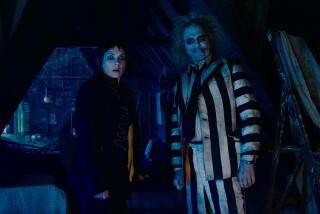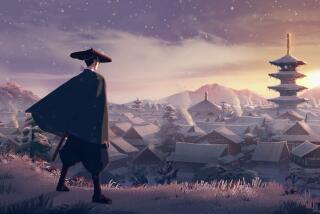The sinister appeal of ‘The Dark Crystal’s’ bad muppets
Puppets are powerful. A sock pulled over a hand becomes a snake; a piece of wood at the end of a string learns to dance. Breathing life into the lifeless is what gods and wizards do, and there is something magical — and a little black magical — about the act, the art, of puppetry. Puppets are delightful and disturbing. We greet them with interest and with apprehension.
Netflix’s prequel to late Muppet man Jim Henson’s 1982 movie “The Dark Crystal,” “The Dark Crystal: Age of Resistance,” is nearly all puppets, nearly all the time. Produced by the Jim Henson Co., now run by Henson children Lisa and Brian, it’s a story of light and dark, good and evil, rebels and overlords set in a galaxy far, far away on a planet called Thra. The film was meant to be frightening, and the series, which has more opportunity for tension and torture — it’s five times longer than the movie, basically the length of the “Lord of the Rings” trilogy — can make Punch and Judy look like a love duet. (There is also comedy in it, which puppets do well, and a little romance, which can be odd.)
Film allowed Henson a bigger canvas, but his work was shaped by television, a friendly place for puppets since its inception. Howdy Doody, a freckle-faced marionette in western wear, made his TV debut four years before “I Love Lucy.” Fran Allison and master of puppets Burr Tillstrom brilliantly improvised every episode of “Kukla, Fran and Ollie” when Del Close was still in junior high. Albert Einstein reportedly made time in his day for Bob Clampett’s hip, droll “Time for Beany” (later a cartoon), with Daws Butler and Stan Freberg puppeteering. Bunny Rabbit and Mr. Moose (the two-handed work of Cosmo Allegretti) kept things lively around the Treasure House on “Captain Kangaroo.” “Pee Wee’s Playhouse” honored that tradition with New Wave verve. A puppet alien named “Alf” even had his own sitcom.
In Netflix’s ‘The Dark Crystal: Age of Resistance,’ a prequel to the beloved 1982 film, Lisa Henson and Louis Leterrier keep the puppetry alive.
Henson got his start while still in college with “Sam and Friends” on a local station out of Washington, D.C. Before “Sesame Street” bowed in 1969, Muppets played “The Ed Sullivan Show” and Rowlf the Dog was a regular on country singer Jimmy Dean’s variety hour. Just before decamping to England to make his own variety-based, world-conquering “The Muppet Show,” Henson created “The Land of Gorch,” a regular feature of “Saturday Night Live” in its first year; its family of unruly, scraggly monsters plays like a warm-up for the grotesqueries of “The Dark Crystal.”
I have no idea how many years before the movie the series is supposed to take place. (Some characters are alive in both, but they are quasi-immortal beings, so that is not much to go by.) For supernatural reasons having to do with the whole ecology of the planet — think of our own ailing Earth here — a powerful crystal has cracked, creating two cosmically intertwined races: the usually agitated, mostly evil, bird-like Skeksis, and the slow-moving, peaceable Mystics, who might be described as six-limbed giant hippie hound dogs. The Skeksis run the planet, whose unquestioning smaller creatures — the faun-fairy Gelflings, the little round Podlings — they variously employ, enslave and drain of their vital essence, which they drink as a rejuvenating pick-me-up. (There is a drug metaphor at work here.)
On “Sesame Street,” Muppets have often been monsters of a friendly disposition: Elmo is a monster, Cookie Monster is a monster for cookies. But the “Dark Crystal” monsters are also muppets. (They are not, legally, Muppets, with a capital M, for that brand has been locked since 2004 in Disney’s unassailable Tower of Intellectual Property.) There is a repertoire of techniques and technologies designed by Henson and his collaborators, a choreographic style as recognizable as Martha Graham’s or Twyla Tharp’s, a physical vocabulary of head shakes, mouth gapes, hand flops, bouncy walks. And so you may see in the Skeksis a hint of Big Bird, in the lumbering Mystics the shadow of Snuffleupagus.
When a Gelfling princess tosses the hair from her face, Miss Piggy springs to mind; any creature whose arms wave wildly in excitement has a bit of Kermit in him. It brings historical richness to “Age of Resistance” but also some cognitive dissonance. That overlay is part of what makes watching the bad puppets torture, kill and casually mistreat the good ones so very disturbing. There were times watching “Age of Resistance” that I, as an adult who has not slept with the light on since high school, had to pause an episode to catch my breath.
Directed by Louis Leterrier (“The Incredible Hulk,” “Clash of the Titans”) and developed by Jeffrey Addiss and Will Matthews, with Javier Grillo-Marxuach (“The Middleman,” “Lost,” “The 100”) as co-executive producer, “Age of Resistance” is far more busily and intricately plotted than the original, with many more characters and deeper characterization. Technical advances give the Gelflings a greater range of expression, fortunately, for they have more — and more varied — acting to do here.
The story is built from the familiar fantasy tool kit: big things preying upon small things, small things fighting back against big things, mystic crystals, magic swords, dangerous journeys, palace intrigue, unlikely simple folk becoming great heroes. There is some “Lord of the Rings” in it, some “Star Wars” — the subtitle “Age of Resistance” would fit any number of films in that franchise — and some “Avatar,” though it is perhaps fairer to say there is some “Dark Crystal” in “Avatar,” the former having preceded the latter by 27 years. We get at least one specific reference to “The Wizard of Oz,” the mother of all quest films.
You can call this recycling or just staying true to genre. (There are some timely twists. “Age of Resistance” is driven by female characters — the Gelfling clans, new to the prequel, are matriarchal; the spirit of Thra is embodied in a character called Mother Aughra; and Sigourney Weaver replaces the movie’s male narrator — and Gelfling Deet has two fathers.) But what matters most is the world-building — really building, with felt and foam and wood and wire and plaster and paint and whatever else it took to make this place and populate it.
Obviously, the world is full of young (and not so young) people who have never known life without supercharged computer animation, whose visual sense has been shaped by video games and movies made to look like video games. There are “Star Wars” fans for whom action-packed 21st century Yoda is the ideal Yoda, not the original puppet played by Henson collaborator Frank Oz, a three-dimensional figure acting in real space in real time. (That Oz was Miss Piggy ought to be basic cultural knowledge.) I do not think it is merely a sign of age that I find such a preference sad.
Digital effects are, of course, the work of human imagination and labor, and not without artistic interest — I enjoyed the Busby Berkeley-Esther Williams look of “Aquaman,” for example. But they are also commonplace and, by nature, lifeless. Indeed, the whole point of modern special effects is to erase any trace of the human hand, in the name of perfect, impossible, antiseptic naturalism. For all their psychedelic clarity, I’ve never seen any CG creation as mind-bending or breathtaking as that first sight of Kermit the Frog riding a bike in “The Muppet Movie.”
There are some computer-generated backgrounds in “Age of Resistance” and other bits of digital housekeeping. Green-screen effects were used to remove puppeteers, but there is no attempt to disguise the fabricated nature of the figures and the sets they inhabit. Light and texture are captured, not re-created. You can sense the air around the characters. That you may be subtly conscious of the human performers behind, below and inside them will not distract from the story, but it does enrich the experience: People made this; we are not entirely hopeless.
About midway through the season, there’s a lovely scene in which two ancient characters school younger ones in “the true history of Thra,” by way of “that most ancient and sacred of arts … puppetry!” (In a nice bit of meta-mockery, their audience groans, though to be fair they have already had to endure “an opera.”)
And then the puppets put on a puppet show, in various styles, and in plain view. It’s an education and a celebration, wonder added to wonder.
‘The Dark Crystal: Age of Resistance’
Where: Netflix
When: Anytime
Rating: TV-PG (may be unsuitable for young children)
More to Read
The complete guide to home viewing
Get Screen Gab for everything about the TV shows and streaming movies everyone’s talking about.
You may occasionally receive promotional content from the Los Angeles Times.







